Quick Answer:
In all states, you need a certificate of title to sell your car, regardless of whether it’s a private sale, trade-in, or through a dealership.
In some states, for vehicles over 15+ years old, a bill of sale can replace a title, letting buyers register at the DMV without the original title.
Key Takeaways:
- Certificate of Title Requirement: In all states, a Certificate of Title is required to sell a car legally.
- Exceptions for Older Vehicles: Some states have exceptions allowing you to sell a car without a title if the vehicle is old enough. In such cases, alternative documentation like a bill of sale may be used for the transaction.
- Selling to Specialized Buyers: In the absence of a title, selling your car for parts to junkyards or salvage yards is an alternative.
Best for Older & Damaged Cars

Buys used, damaged or junk cars
Free tow and no hidden fees
Pays by ACH trasfer or check
Top Pick for Junk Cars

Free, no-obligation cash offers
Offers free paperwork service
Pays on the spot upon pick up
How to Sell a Car Without a Title?
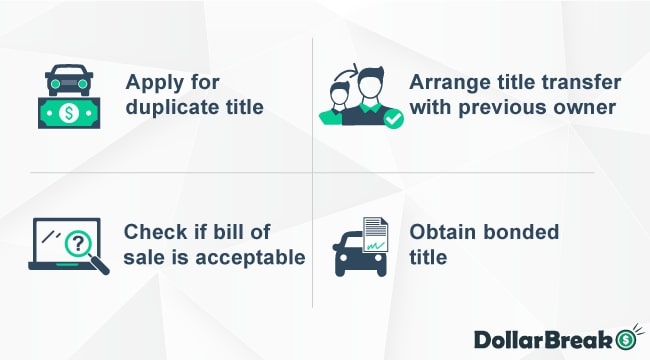
There are multiple ways to get a lost title, especially if you have registered it in your name or can provide a bill of sale to prove ownership.
However, if you never had the document transferred to your name, you will need to take some extra steps.
1. Apply for Duplicate Title
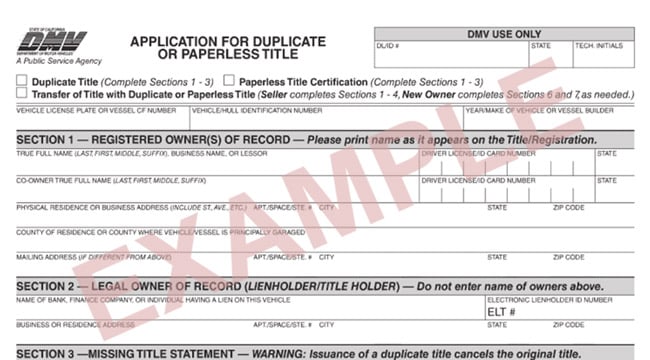
If you are a rightful owner of the car, meaning the ownership was transferred to you when you bought the car but lost the title document, you can easily apply for a title duplicate at your local DMV in person or fill in a form online.
To apply for title duplicate:
- Visit the local DMV office, fill in the online form, or send the application via mail
- Provide driver’s license or ID, VIN number and license plate number
- Pay duplicate title fee
Duplicate title fees vary from state to state, range between $5 to $60, and will take 7-10 business days to be delivered. If you choose to receive the title by mail, it can take up to 30 days.
There is an option to request an urgent procedure, but expect to pay additional fees.
2. Contact the Previous Owner
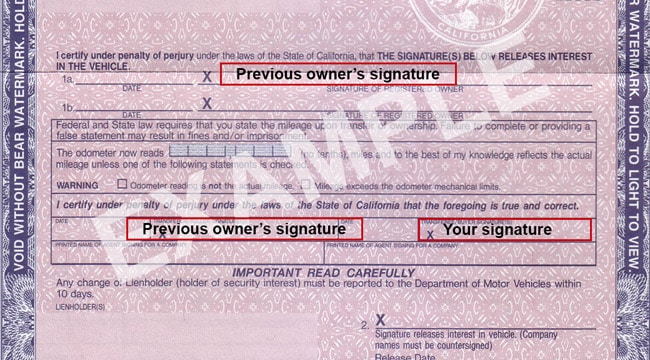
There might be a case that you either purchased the vehicle without the title or it was never transferred to your name due to incorrectly filed information, or the seller’s mistake, inheritance or vehicle was gifted to you.
In this case, you should first contact the previous owner, explain the oversight, and ask to fill in the title transfer application.
It would be best to meet at the DMV office and fill in the paperwork in person to ensure it is correctly completed.
Both of you will need to provide an identification card or driver’s license. If the previous owner does not possess the document, he will need to apply for a duplicate title beforehand.
3. Apply for Replacement
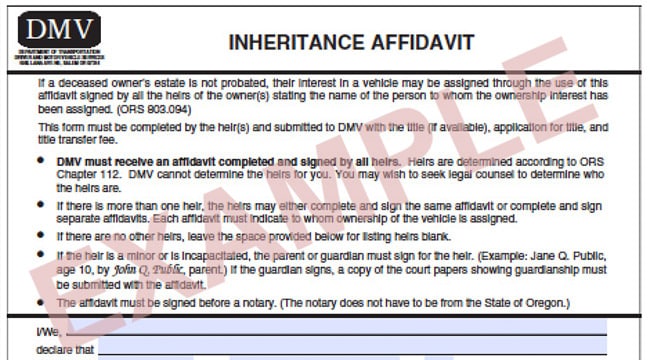
If you received the car as a gift or it was inherited and you do not have a title in your name, you have a few options:
- Ask the rightful owner to transfer a title to your name. In this case, you should follow a standard title transfer procedure at your local DMV
- Apply for a replacement title. Provide proof of ownership, such as an inheritance document. Depending on your state, you will need to pay a fee ranging from $15 to $40.It can take a few weeks to receive the replacement title
If the previous one that gifted you the car or you inherited from is not alive, you will need to provide a death certificate, prove that you are the rightful owner of the vehicle and apply for title transfer by filling in the required forms at DMV.
You will be responsible;e for registering and insuring the car using the received title with your name. Receiving a new title usually takes up to a few weeks.
4. Write Up A Bill Of Sale
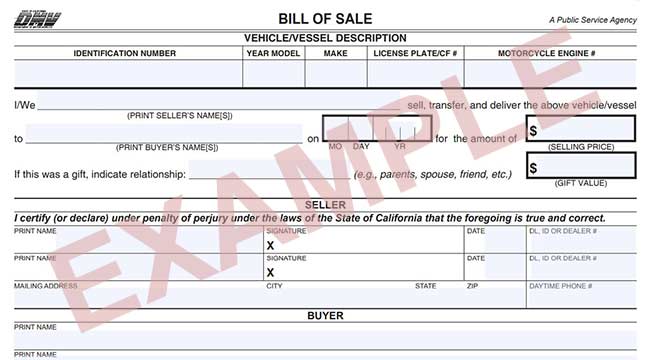
Some states, such as NY, did not issue car titles until 1973. These states do not require to have a car title for old cars. The age requirement depends on the state; typically, it varies from 15 to 25 years.
If you are selling an old car and your state offers exceptions, you will need to provide the bill of sale as proof of your ownership.
5. Register Your Vehicle in Vermont
Registering a vehicle over 15 years old without a title in Vermont is a widely recognized loophole. Vermont doesn’t require titles for such vehicles; a bill of sale suffices for registration. Once registered, you can legally drive the vehicle across the U.S., even in states that mandate titles.
Classic car enthusiasts and those buying from salvage yards or private sellers without titles favor this approach. Some also use it to sidestep sales tax on used vehicle purchases.
However, there are challenges. Reselling in other states may prove difficult, and insurance claims can get complicated without a proper title. While the Vermont method is cost-effective, it’s essential to consider its potential risks.
6. Pay-off the Loan
If you want to sell a car on loan, first of all, you should remember that you do not own the car – the lender does. In this case, you need to decide if you are selling the car privately or via the dealership.
If you are selling a leased car privately:
The best option to sell privately is to pay off the loan before transferring the title to the buyer. When the loan is paid off, you become a legal owner of the car, get a clean title, and will be able to sell it.
If you can not do that, you can refinance the loan or use the received sale money to cover the debt if the buyer agrees. This might get tricky as most buyers are not interested in such an offer, concerning possible financial burden risks. Moreover, the buyer won’t get the title transferred to his name until you get a clean title.
If you are selling a leased car via a dealership:
If you can’t pay off the loan, refinance it or sell privately taking too long, the best option is to sell it to a car buying service that buys financed cars, such as Wheelzy or CarBrain.
While specific requirements and details vary, depending on the lease agreement you have, selling to the dealership can not only help you get the money quickly but also will save you tons of time as they take care of all the necessary paperwork for you.
CarBrain, for example, will send you a cash offer within a few minutes, and you will have 7 days to accept the offer.
It is important to find out the amount of payoff first and then calculate if you own more or less than the car’s worth.
If you owe less, Carbrain will cover the debt and pay off left money directly to you. If you owe more – you will be responsible for paying off the left loan debt.
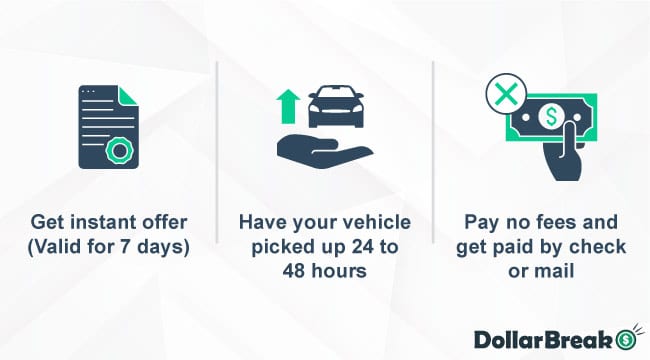
7. Obtain Bonded Title
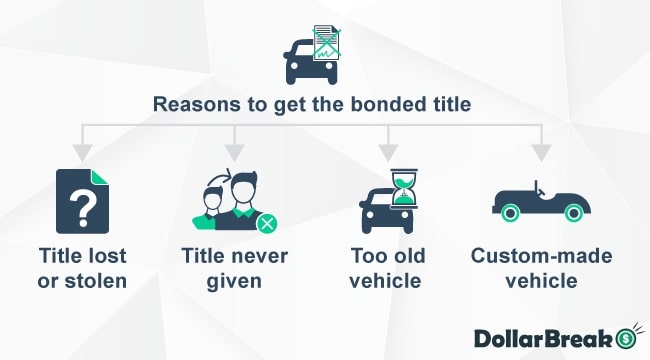
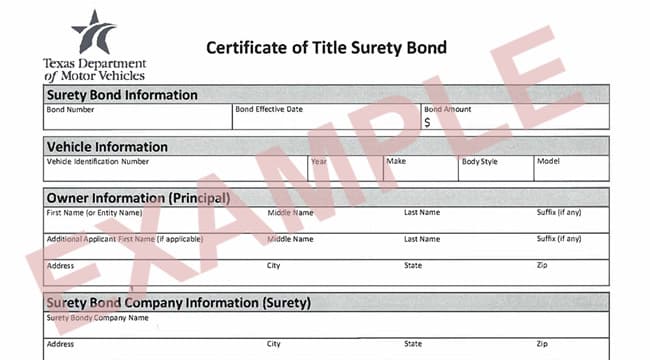
A bonded title, also known as a Certificate of Title or Lost Title Bond, is a document that establishes who owns a vehicle. This document can be used instead of a traditional title to register, get insurance or sell the car.
When you apply for a bonded vehicle title, you must pay a surety bond. A surety bond is a guarantee to be liable for any debt, default, or failure of the principal. The amount of the fee depends on each state.
The bond amount typically equals the value of the vehicle. However, you usually don’t pay the full bond amount; instead, you pay a percentage of it, known as the bond premium.
The bond premium usually ranges from 1% to 15% of the bond amount, depending on various factors, including your personal credit score, your financial history, and the specifics of your situation. For instance, if your vehicle is appraised at $10,000 and the bond premium rate is 10%, you would pay $1,000 for the bond.
Reasons to get the bonded title:
- Original car title lost or stolen
- The vehicle was paid for, but the title was never given, and the lender is out of business
- The vehicle is too old to have a title
- Vehicle is custom-made
Worth mentioning that not all states allow bonded states, and in that case, you should consider the court-ordered title.
States that do not allow bonded titles:
- Delaware
- District of Columbia
- Kansas
- Kentucky
- Louisiana
- Maryland
- New Jersey
- North Dakota
- Oklahoma
- Oregon
- Pennsylvania
- South Carolina
- South Dakota
- Virginia
- West Virginia
The exact process of obtaining bonded title varies by state, but it generally involves determining the bond amount, purchasing surety bonds and applying for title at DMV.
- Bond Amount: Determine the value of your car. This can be done using a free online Kelley Blue Book car’s value calculator tool. It will take only a few minutes; you will be asked to provide car details and describe the condition. You will get the estimates of potential value selling privately, to the dealership or if trading in.
- Buy surety bond: This type of insurance protects the state and any potential previous owners if someone else claims ownership of the vehicle. You can buy a surety bond from an insurance or bonding company.
- Apply for title at DMV: Provide documents such as the bill of sale, the current registration, and the surety bond
A bonded title is obtained for 3-5 years, depending on state laws, and won’t be transferred to the new owner. Instead, your name will still be on it, and you will be responsible for the vehicle.
This is not a good option for abandoned vehicles or cars, as you can’t prove that ownership was legally transferred to you.
8. Get Court-Ordered Title
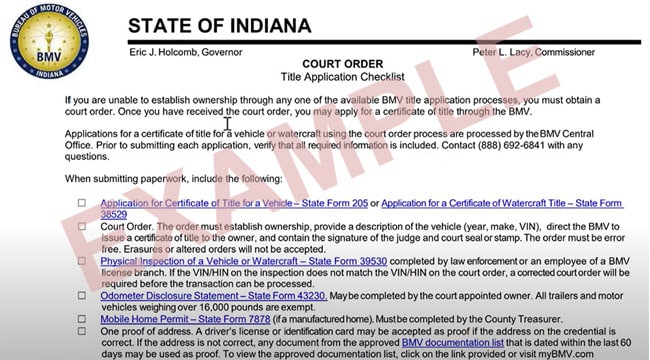
The court-ordered title process is for vehicle owners who are not eligible for typical title recovery methods due to missing paperwork, damaged or mutilated title documents, or other circumstances that render them ineligible, according to their county. When all else fails, you can apply for a court-ordered title.
Each county in the US has its own court-ordered title process, and before applying, you must attempt to obtain a vehicle title at the DMV.
To get court order title:
Step 1: File a petition at your county courthouse
Step 2: Submit a DPPA request for the registered owner and lienholder information
Step 3: Send the registered owner and lienholder an official notice (if you have contacts)
Step 4: Schedule a hearing with a judge
Step 5: Take the court order to the DMV
The court-ordered title process is not simple and may cost you additional fees, but it is an available process if all other methods of title recovery are unavailable for your situation
9. Sell Car for Parts
Many junkyards and salvage yards are willing to purchase vehicles without a title to dismantle them and sell the parts.
However, rules and regulations on this can vary by location, so it’s always best to check local laws and consult with an attorney or junkyard to make sure you’re not unknowingly violating any rules.
Make sure to sign the purchase agreement, including information that the car is being sold for parts and that there is no title.
Reasons For The Missing Title
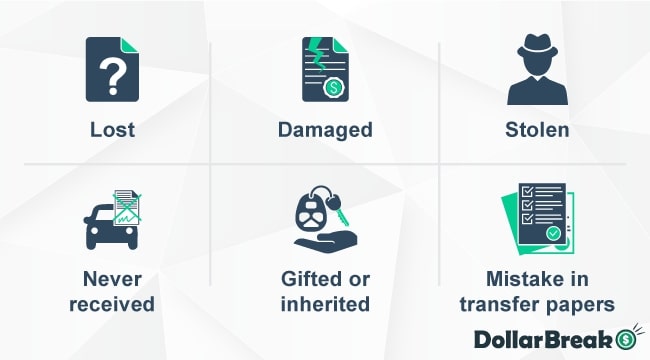
The car title serves as the official record of vehicle ownership, making it a critical document in selling transactions. You should store the car title in a secure place, like a safe or safe deposit box. However, losing the title is quite common.
However, there are times when this document might be missing, and understanding the reasons behind this can help effectively resolve the situation.
- The document was lost during moving
- The document was damaged due to fire, water damage or other accidents
- The document was stolen
- The buyer never received the paper
- Vehicle was gifted or inherited
- Title transfer documents were filed incorrectly
Why Title is Important?
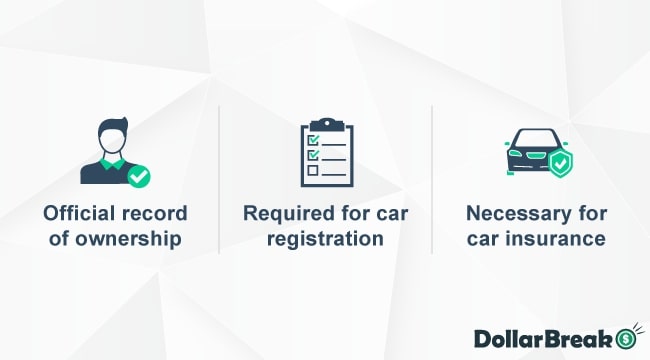
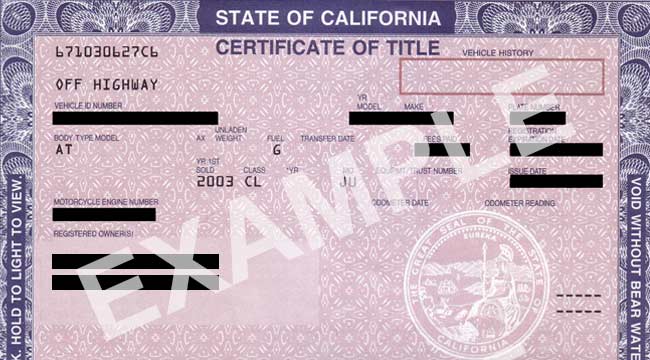
Because it’s the official record of ownership issued by the state government, you can’t legally sell your car or transfer ownership to a new buyer without it.
Additionally, this document is required to register your car, get car insurance or apply for a loan if the car is used as collateral.
The information on a car title includes the following:
- Vehicle identification number (VIN)
- Car make, model and year
- Owner’s full name
- Owner’s address
- Title issue date
- Odometer reading on the issue date
- Signatures of the buyer, seller, and a state official
People Also Asked
Can you register a car without a title?
No, you cannot register a car without a title unless your local DMV exempts it.
Can you go to jail for selling a car without a title?
If you try to sell a car without a title in your name, you don’t have the authority to do so. You may also face fines and some jail time, and you may still be legally responsible for the car.
Can I sell my car without a title to a dealership?
Selling a car to a dealership without a title is typically not allowed. Dealerships need to see a title in order to accept the vehicle and complete the transaction legally.





